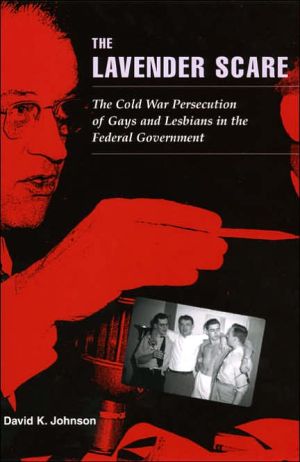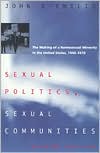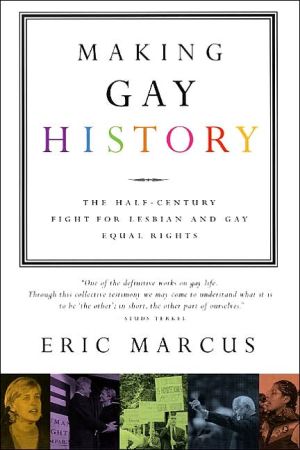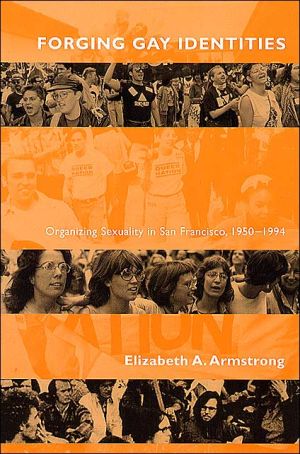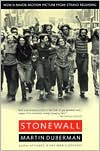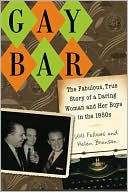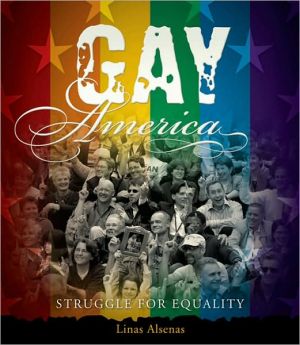The Lavender Scare: The Cold War Persecution of Gays and Lesbians in the Federal Government
In Cold War America, Senator Joseph McCarthy enjoyed tremendous support in the fight against what he called atheistic communism. But that support stemmed less from his wild charges about communists than his more substantiated charges that “sex perverts” had infiltrated government agencies. Although now remembered as an attack on suspected disloyalty, McCarthyism introduced “moral values” into the American political arsenal. Warning of a spreading homosexual menace, McCarthy and his Republican...
Search in google:
The McCarthy era is generally considered the worst period of political repression in recent American history. But while the famous question, "Are you now or have you ever been a member of the Communist Party?" resonated in the halls of Congress, security officials were posing another question at least as frequently, if more discreetly: "Information has come to the attention of the Civil Service Commission that you are a homosexual. What comment do you care to make?"Historian David K. Johnson here relates the frightening, untold story of how, during the Cold War, homosexuals were considered as dangerous a threat to national security as Communists. Charges that the Roosevelt and Truman administrations were havens for homosexuals proved a potent political weapon, sparking a "Lavender Scare" more vehement and long-lasting than McCarthy's Red Scare. Relying on newly declassified documents, years of research in the records of the National Archives and the FBI, and interviews with former civil servants, Johnson recreates the vibrant gay subculture that flourished in New Deal-era Washington and takes us inside the security interrogation rooms where thousands of Americans were questioned about their sex lives. The homosexual purges ended promising careers, ruined lives, and pushed many to suicide. But, as Johnson also shows, the purges brought victims together to protest their treatment, helping launch a new civil rights struggle.The Lavender Scare shatters the myth that homosexuality has only recently become a national political issue, changing the way we think about both the McCarthy era and the origins of the gay rights movement. And perhaps just as importantly, this book is a cautionary tale, reminding us of how acts taken by the government in the name of "national security" during the Cold War resulted in the infringement of the civil liberties of thousands of Americans. American Quarterly "By demonstrating the extent to which gay history is part of mainstream history, [Johnson] continues the important academic endeavor of bringing the margins to the center."—Fiona Paton, American Quarterly— Fiona Paton
The Lavender Scare \ The Cold War Persecution of Gays and Lesbians in the Federal Government \ \ By David K. Johnson \ The University of Chicago Press \ Copyright © 2004 David K. Johnson\ All right reserved.\ ISBN: 978-0-226-40481-3 \ \ \ \ \ Chapter One \ Peurifoy's Revelation\ The Politics of the Purges\ If you had been in this work as long as we have been, you would realize that there is something wrong with each one of these individuals. You will find that practically every active Communist is twisted mentally or physically in some way. -U.S. intelligence official, quoted by Joseph McCarthy\ Throughout the month of February 1950, the charges kept changing. In Wheeling, West Virginia, Senator Joseph McCarthy first made national headlines when he told a Republican women's group that the State Department harbored 205 "card-carrying Communists." In the next few days, as journalists swarmed his office and the State Department issued denials, he reduced their status to "bad risks" and the number to 57. Under mounting pressure to provide specifics, McCarthy stood in the well of the U.S. Senate chamber on the evening of February 20 and gave the American public detailed information about the subversives he alleged were still working in the State Department. In what a reporter dubbed "one of the maddest spectacles in the history of representative government," McCarthy presented a case-by-case analysis lasting six hours of what he was then calling "81 loyalty risks." After numerous shouting matches over the conflicting figures and statements made since the Wheeling speech, McCarthy led his Senate colleagues through each case. In most he accused various officials of "palling around with Communists," joining Communist-front organizations, reading their literature, or acting as Soviet agents. But two cases stood out from the rest. They were not about individuals but groups, and they were less about political than sexual deviance. Case no. 14 involved a "flagrantly homosexual" translator who had been dismissed as a "bad security risk" but was later reinstated by a "high State Department official." The translator, McCarthy warned, had "extremely close connections with other individuals with the same tendencies," and therefore represented a larger problem. These "very unusual individuals," McCarthy explained, were not only homosexual but "active members of Communist-front organizations," including the Young Communist League. Some of them, McCarthy asserted, were "active Soviet agents." Case no. 62 was also unusual in that it involved a whole group of homosexual employees. "I think this will be of interest to the committee," McCarthy emphasized, "in that it gives a rather interesting picture of some rather unusual mental twists of these gentlemen who are tied up with some of the Communist organizations."\ Although only two of his charges were homosexuals, McCarthy singled them out as illustrative of a larger truth. In the middle of reciting the details of both homosexual cases, McCarthy paused to relate a conversation he recently had with a "one of our top intelligence men in Washington." Wondering why some people were so "fanatically Communist," McCarthy asked the official what was so attractive about the Communist philosophy. "If you had been in this work as long as we have been," the intelligence officer allegedly told McCarthy, "you would realize that there is something wrong with each one of these individuals. You will find," he asserted, "that practically every active Communist is twisted mentally or physically in some way." Historians of the McCarthy era often quote this twice-told tale to demonstrate how membership in the Communist Party was considered evidence of a psychological maladjustment in the 1950s. But the context of the story suggests that the claim was much more specific. Homosexuality, McCarthy asserted, was the psychological maladjustment that led people toward communism. The Red Scare now had a tinge of lavender.\ The State Department's responses to McCarthy's charges also changed, vacillating between clear denials and more vague pronouncements. They would eventually spark as much controversy as the charges themselves. John Peurifoy, head of the department's security program, quickly issued a press release denying that the State Department harbored any Communists. At the same time, the department admitted that it had dismissed 202 "security risks." At their first opportunity, members of Congress pressed department officials for clarification. On February 28, 1950, a week after McCarthy's speech to the Senate, Secretary of State Dean Acheson made his first public appearance on Capitol Hill since McCarthy had begun making headlines. Though the official purpose of the hearing was to review the department's appropriations for the next fiscal year, the furor over McCarthy's charges brought out the press and the news cameras. Senator Styles Bridges (R-New Hampshire), among the most powerful Republican senators, began the questioning. "Mr. Secretary, what do you consider a security risk?" Bridges inquired. Acheson carefully explained that under the State Department's security program, persons who engaged in espionage, divulged classified information, or joined Communist or Nazi organizations were all considered security risks. In addition to these specific examples, Acheson noted that the department considered other criteria when screening its employees-"whether the person has, as a matter of character, any defect which would lead him into any of these difficulties." Bridges sought clarification. "Such as homosexuality?" he wondered. "That would be included," Acheson conceded. Bridges, the ranking Republican on the committee, then asked about a provision the committee had added to the department's appropriations bills to facilitate removing such security risks. How many security risks, Bridges wanted to know, had been removed under this provision known as the "McCarran rider." When Acheson responded that only one person had been so removed, Bridges persisted. "Now, how many other people that have been under investigation by the department have resigned?" he asked. Jumping in for his boss, Deputy Undersecretary for Administration John Peurifoy offered to respond. "In this shady category that you referred to earlier, there are ninety-one cases, sir." Unsatisfied with this coy offering, Bridges pressed for clarification. "What do you mean by 'shady category'?" he intoned. Peurifoy, mindful of the presence of the press, tried another euphemism. "We are talking about people of moral weaknesses and so forth," he offered. At this point Chairman Patrick McCarran (D-Nevada) grew impatient. "Now, will you make your answer a little clearer, please," he insisted. Peurifoy was backed into a corner. "Most of these were homosexuals, Mr. Chairman," he finally conceded.\ Peurifoy was as reticent to utter the word "homosexuals" as his congressional interrogators were eager to hear it. No chance remark, this pivotal testimony was a political performance orchestrated by a congressional tag team intent on assisting Senator McCarthy and embarrassing Acheson's State Department and the entire Truman administration. For the last three years, Senator Bridges and his colleagues had been actively involved in establishing and monitoring the State Department's security program. As recently as a month earlier, their colleagues in the House had elicited nearly the same testimony from Peurifoy. But these previous oversight hearings had been held behind closed doors. With the rise of McCarthy and the new national spotlight on subversion in the State Department, Bridges and his colleagues decided it was time to reveal the results of what had been a quiet campaign to remove security risks from the State Department. It would strengthen McCarthy's position by lending credence to his charges. At the same time, it suggested that Communist infiltration was not the only threat facing the nation and that McCarthy might be more successful if he enlarged his campaign to include all those considered "security risks."\ Hoping to make headlines, Peurifoy's questioners were not disappointed. Like McCarthy's charges, the revelation that ninety-one homosexuals had been dismissed from the State Department unleashed a flurry of newspaper columns, constituent mail, public debate, and congressional investigations throughout 1950 about the presence of homosexuals in government and their connections to Communists. The revelation set in motion a chain of events that would have widespread repercussions for governmental security policies and the millions of people affected by them for the next twenty years. Within weeks, Guy Gabrielson, chairman of the Republican National Committee, observed that the revelation was "the talk of Washington and of the Washington correspondents corps." Writing to thousands of party workers, Gabrielson warned that "perhaps as dangerous as the actual Communists are the sexual perverts who have infiltrated our Government in recent years." Headlines warning of "Perverts Fleeing State Dept." peppered newspapers throughout the country. While members of Congress held hearings to determine how to "eradicate this menace," jokes circulated about the "lavender lads" in the State Department. The issue was so frequently discussed on the Senate and House floors that one congressman complained about all the attention given to homosexuals. With all the numbers being bandied about that spring, the number ninety-one became shorthand for the lavender menace threatening the nation. On the national radio program "Meet the Press" in April, guests discussed "the ninety-one" fired from the State Department as if the term needed no explanation. The issue of homosexuals in government, observed columnist John O'Donnell, constituted "a new type of political weapon-never used in this republic." He predicted it would destroy the confidence of the American people in the State Department and might "wreck the Administration." Seeing this as evidence of "depravity in the Roosevelt-Truman bureaucracy," Westbrook Pegler lamented, "[T]here is no record of comparable corruption in American history."\ Though politically motivated by congressional Republican leaders, the Peurifoy revelation soon became an issue well beyond the confines of Capitol Hill. Peurifoy's revelation seemed to substantiate McCarthy's charges and strengthen his public support. Letters poured into the White House, the State Department, Capitol Hill, and news outlets from outraged citizens. As one reporter wrote, "The unexpectedly large number of perverts dismissed from the State Department also worries the public, it appears from the mail which the lawmakers are receiving daily." A preliminary sampling of McCarthy's mail revealed that only a quarter of the twenty-five thousand writers expressed concern about "red infiltration." The other three-quarters, one newspaper reported, "are expressing their shocked indignation at the evidence of sex depravity." Another columnist noted that "the writers are less worried over the ideological tendencies of State Department officers who are involved then they are by their nasty moral habits." As one woman from Long Island wrote to the New York Daily News, "The homosexual situation in our State Department is no more shocking than your statement that 'they are uncertain what to do about it.' Let every American who loves this country get behind McCarthy or any committee which will thoroughly investigate and expose every one of these people.... This is no time for compromise. Democrats or Republicans-we must rid our Government of these creatures."\ News that the State Department had fired ninety-one homosexuals gave credibility to McCarthy's vague charges and enhanced his public standing. Though he was involved in neither their removal nor the revelation of their removal, McCarthy was soon given credit for both. "He has forced the State Department to fire 91 sex perverts," gushed conservative Representative Noah Mason (R-Illinois), praising McCarthy's alleged accomplishments in the two months since his Wheeling speech. Speaking of what he called "the popular side of his controversy with the State Department," Congressman Lawrence Smith from McCarthy's home state of Wisconsin echoed this praise. "Already his actions have flushed out homosexuals in that Department," Smith noted approvingly. Journalists also remarked on the close association in the public mind between McCarthy and the Peurifoy revelation. Trying to explain McCarthy's widespread public support despite press denunciations of his charges as reckless, irresponsible, and lacking proof, one commentator pointed to the Peurifoy revelation. "In the midst of all this, [the public's] confusion was increased and their resentment enhanced" by Peurifoy's statement, he explained. As the Washington Star reported, "Not much has been made of it in the press, but politicians generally agree that their constituencies have been more revolted at this voluntary disclosure than by anything else."\ In McCarthy's home state of Wisconsin, his attack on Truman's State Department reinvigorated what until then had seemed like a faltering political career. As historian Michael O'Brien noted, it transformed him "from a bumbling senator doomed to political oblivion into the idol of Wisconsin Republicans." But here, too, it was the attacks on "sex perverts" that most concerned them. A columnist for the Green Bay Press-Gazette reported that rural politicians had learned that the Republican rank-and-file were most exercised about the homosexuals-in-government issue. At a meeting of Republican state party leaders to decide whether to back McCarthy, much of the discussion centered on "sex perverts" and the concern these charges raised with voters. One top Wisconsin Republican and McCarthy fundraiser, Thomas Coleman, rallied national Republican leaders to McCarthy's cause by giving the homosexual charges equal billing with those against Communists. As he told a National Republican Strategy Committee in April, "Our party is finally on the attack and should stay there. And best of all, we may get rid of many Communist sympathizers and queers who now control policy."\ In 1950, Republicans were a desperate and frustrated party that had been out of power for eighteen years, since the 1932 defeat of President Herbert Hoover by a triumphant Franklin Roosevelt and his New Deal coalition. Not only had Roosevelt won an unprecedented four terms in office, through the Great Depression and World War II, but also his Democratic successor, Harry Truman, had come from behind to squelch what seemed like a certain Republican victory in 1948. That year Republicans were so certain of recapturing the White House that their presidential nominee, Thomas Dewey, barely campaigned and ignored the burgeoning issue of Communists in government. They would not let it happen again. But their lack of power was not the only thing that concerned Republicans. They were also concerned about the direction in which the country, indeed the world, seemed to be going. With the recent conviction of British atomic scientist Klaus Fuchs for espionage on the Manhattan Project and that of former State Department official Alger Hiss for perjury in denying he spied for the Soviet Union, McCarthy's charges, however vague, seemed plausible. How else, they reasoned, except through the infiltration of the U.S. government, could Communists have so quickly acquired the secrets of atomic weapons and taken over China. And now it seemed that Communists were not acting alone but had recruited homosexuals to help steal secrets.\ (Continues...)\ \ \ \ \ Excerpted from The Lavender Scare by David K. Johnson Copyright © 2004 by David K. Johnson. Excerpted by permission.\ All rights reserved. No part of this excerpt may be reproduced or reprinted without permission in writing from the publisher.\ Excerpts are provided by Dial-A-Book Inc. solely for the personal use of visitors to this web site. \ \
Acknowledgments Introduction: "Panic on the Potomac" 1. Peurifoy's Revelation: The Politics of the Purges 2. "This Used to Be a Very Gay City:" Lafayette Park and the Sex Crime Panic 3. "Cookie Pushers in Striped Pants:" The Lavender Lads in the State Department 4. "Fairies and Fair Dealers:" The Immoral Bureaucracy 5. The Hoey Investigation: Searching for a Homosexual Spy 6. "Let's Clean House:" The Eisenhower Security Program 7. Interrogations and Disappearances: Gay and Lesbian Subculture in 1950s Washington 8. "Homosexual Citizens:" The Mattachine Society of Washington Epilogue Notes Oral History Interviews Index
\ Gay Today - Raj Ayyar\ "Dr. Johnson has provided today's generation with disturbing details of the maltreatment that U.S. security agents visited upon thousnads of loyal American citizens, people who endured vile campaigns against their well-being, conducted by their own government. The Lavender Scare has great current significance as a work of history because it exposes the anti-gay fear-mongering that Republicans initiated during the Cold War Era....a stellar work, one of the most important published gay histories there is."\ \ \ \ \ \ Book Marks - Richard Labonte\ "A gripping study of sanctioned homophobia in the McCarthy era and a celebration of the stubborn fight by a pre-Stonewall few that ultimately won rights for many, and of a cultural and sexual underground that survived even at the height of an unrelenting homophobia spanning the presidencies of Truman through Nixon."\ \ \ \ The Washington Blade"The hoary rhetoric about the supposedly treasonous/treacherous nature of homosexuality that the historian David K. Johnson documents in his fine new book can initially strike a reader as amusing. The homophobic fulmination of varoius McCarthy-era senators and representatives he quotes are fatuous, if not ludicrous. But as The Lavender Scare goes on to reveal, the jaw-dropping extent of the federal government's persecution of its gay and lesbian employees in the '50s and '60s turns amusement into rage."\ \ \ \ \ \ American Quarterly"By demonstrating the extent to which gay history is part of mainstream history, [Johnson] continues the important academic endeavor of bringing the margins to the center."\ \ \ \ \ \ Gay & Lesbian Review"The Lavender Scare provides a superb overview of this period in American history. . . . It's a must-read for gay and lesbian federal employees, and would serve as an excellent text for college or graduate-level courses in history, sociology, political science, or gay studies."\ \ \ \ \ \ GLQ"Keenly observed and elegantly written, with a sense of mystery and suspense indicative of the era, Johnson's book will reorient scholarship on the Cold War as it models a more complex method for integrating queer community history with economic and political history."\ \ \ \ \ \ Archives of Sexuality"The Lavender Scare is a very readable and valuable work that clarifies the relationship between the Cold War and national security interests, and those victimized by the need to preserve said security. . . . This work will take its place beside those of George Chauncey and Allen Berube, and every serious student of 20th century American history should own it."\ \ \ \ \ \ American Communist History"What does it say about the historical profession that it has taken nearly 30 more years to tell this story? Fortunately, David K. Johnson has done so with intelligence, sensitivity, and grace. We are all in his debt."\ \ \ \ \ \ Journal of American History"Johnson's work assures that we shall never again be able to think about the anticommunist crusade without acknowledging its fierce counterpart that affected the lives of so many people."\ \ \ \ \ \ Los Angeles Times“Fifty years ago, gays ‘confronted a degree of policing and harassment that is almost unimaginable to us today’ and which now is almost entirely forgotten. David K. Johnson’s The Lavender Scare: The Cold War Persecution of Gays and Lesbians in the Federal Government is a heart-wrenching reminder that homosexuals faced brutal employment discrimination and endless police hostility.”\ \ \ \ \ \ American Journal of Sociology"Johnson's dazzling social and political history puts the Cold War persecution of gays and lesbians center stage to highlight how the social and cultural anxieties around gender and sexuality dovetailed with the nation's state-building project in the post-World War II era."\ \ \ \ \ \ American Historical Review"An important book, one that promises to reorient the historical scholarship on the Cold War."\ \ \ \ \ \ H-Net Reviews“By utilizing an impressive array of primary sources and integrating political, social, and cultural history, historian David Johnson provides us with a much needed, in-depth analysis. . . . A valuable contribution to our understanding of the Cold War and those who became victims of the national security state. It corrects certain misconceptions about the targets of McCarthyism to reveal that homosexuals were a unique focus in a parallel witch hunt to those who did not conform to 1950s society and beyond."\ \ \ \ \ \ The Weekly News“An important work of gay scholarship that proves, once and for all, that the Lavender Scare was not a minor adjunct of the Red Scare, but a major government campaign in its own right. . . . The Lavender Scare is more than a great work of history. It is a cautionary tale.”\ \ \ \ \ \ H-Net Reviews in the Humanities and Social Sciences"A valuable contribution to our understanding of the Cold War and those who\ \ \ \ \ \ Gay TodayDr. Johnson has provided today's generation with disturbing details of the maltreatment that U.S. security agents visited upon thousnads of loyal American citizens, people who endured vile campaigns against their well-being, conducted by their own government. The Lavender Scare has great current significance as a work of history because it exposes the anti-gay fear-mongering that Republicans initiated during the Cold War Era....a stellar work, one of the most important published gay histories there is.\ — Raj Ayyar\ \ \ \ \ \ Book MarksA gripping study of sanctioned homophobia in the McCarthy era and a celebration of the stubborn fight by a pre-Stonewall few that ultimately won rights for many, and of a cultural and sexual underground that survived even at the height of an unrelenting homophobia spanning the presidencies of Truman through Nixon.\ — Richard Labonte\ \ \ \ \ \ Dallas Morning News"David Johnson's engrossing study of the persecution of gays and lesbians during the Cold War, complete with a comprehensive picture of the gay culture that flourished in Washington, is an important addition to a subject all too often ignored."\ \ \ \ \ \ The Washington BladeThe hoary rhetoric about the supposedly treasonous/treacherous nature of homosexuality that the historian David K. Johnson documents in his fine new book can initially strike a reader as amusing. The homophobic fulmination of varoius McCarthy-era senators and representatives he quotes are fatuous, if not ludicrous. But as The Lavender Scare goes on to reveal, the jaw-dropping extent of the federal government's persecution of its gay and lesbian employees in the '50s and '60s turns amusement into rage.\ — Kevin Riordan\ \ \ \ \ \ American QuarterlyBy demonstrating the extent to which gay history is part of mainstream history, [Johnson] continues the important academic endeavor of bringing the margins to the center.\ — Fiona Paton\ \ \ \ \ \ Gay & Lesbian ReviewThe Lavender Scare provides a superb overview of this period in American history. . . . It's a must-read for gay and lesbian federal employees, and would serve as an excellent text for college or graduate-level courses in history, sociology, political science, or gay studies.\ — Lawrence Reynolds\ \ \ \ \ \ GLQKeenly observed and elegantly written, with a sense of mystery and suspense indicative of the era, Johnson's book will reorient scholarship on the Cold War as it models a more complex method for integrating queer community history with economic and political history.\ — John Howard\ \ \ \ \ \ Archives of SexualityThe Lavender Scare is a very readable and valuable work that clarifies the relationship between the Cold War and national security interests, and those victimized by the need to preserve said security. . . . This work will take its place beside those of George Chauncey and Allen Berube, and every serious student of 20th century American history should own it.\ — Aaron L. Bachhofer\ \ \ \ \ \ American Communist HistoryWhat does it say about the historical profession that it has taken nearly 30 more years to tell this story? Fortunately, David K. Johnson has done so with intelligence, sensitivity, and grace. We are all in his debt.\ — Ellen Schrecker\ \ \ \ \ \ Journal of American HistoryJohnson's work assures that we shall never again be able to think about the anticommunist crusade without acknowledging its fierce counterpart that affected the lives of so many people.\ — Leila J. Rupp\ \ \ \ \ \ Los Angeles TimesFifty years ago, gays ‘confronted a degree of policing and harassment that is almost unimaginable to us today’ and which now is almost entirely forgotten. David K. Johnson’s The Lavender Scare: The Cold War Persecution of Gays and Lesbians in the Federal Government is a heart-wrenching reminder that homosexuals faced brutal employment discrimination and endless police hostility.”\ — David J. Garrow\ \ \ \ \ \ In These Times"A riveting history of gay-baiting in the McCarthy era"\ \ \ \ \ \ American Journal of SociologyJohnson's dazzling social and political history puts the Cold War persecution of gays and lesbians center stage to highlight how the social and cultural anxieties around gender and sexuality dovetailed with the nation's state-building project in the post-World War II era.\ — Steve Valocchi\ \ \ \ \ \ American Historical ReviewAn important book, one that promises to reorient the historical scholarship on the Cold War.\ — Robert J. Corber\ \ \ \ \ \ H-Net ReviewsBy utilizing an impressive array of primary sources and integrating political, social, and cultural history, historian David Johnson provides us with a much needed, in-depth analysis. . . . A valuable contribution to our understanding of the Cold War and those who became victims of the national security state. It corrects certain misconceptions about the targets of McCarthyism to reveal that homosexuals were a unique focus in a parallel witch hunt to those who did not conform to 1950s society and beyond.\ — Douglas M. Charles\ \ \ \ \ \ The Weekly NewsAn important work of gay scholarship that proves, once and for all, that the Lavender Scare was not a minor adjunct of the Red Scare, but a major government campaign in its own right. . . . The Lavender Scare is more than a great work of history. It is a cautionary tale.”\ — Jesse Monteagudo\ \ \
